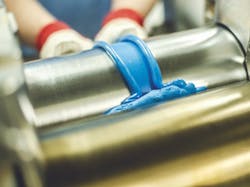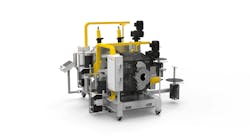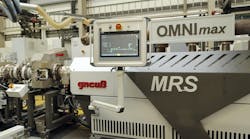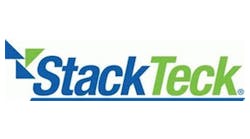From the Spring 2024 issue of Plastics Recycling.
By Marissa McNees
The swimming pool industry—specifically pool liner manufacturing—has been a bit behind when it comes to sustainability and recycling, according to Alex Grover of flexible plastic film manufacturer i2M, but her team is out to change that.
The firm, based in Mountaintop, Pennsylvania, where its manufacturing and warehousing operations also are located, was founded in 2009 and designs manufactures and prints three types of flexible plastic films: heavy-duty, precision and decorative.
It specializes in products such as gravure printed wood-grain laminates, roofing membranes and pool liners—a product traditionally made from vinyl or polyvinyl chloride (PVC) that often is destined for landfill after its 10-to-20-year life span.
“If you Google, ‘Is PVC recyclable?’ right now, it’ll say no. Every time I see that, I’m thinking … we’re literally doing it every day,” Grover says. “Not only that, it’s one of the most carbon-emission-friendly plastics or even material of that sort to recycle. … So, at our core, we would be crazy not to at least recycle what we’re internally generating, so it kind of started there.”
Grover has been leading i2M for about three years and has worked in several areas of the business. When she took over as president and CEO, she put sustainability at the forefront of i2M’s operations.
“From the start of i2M, our focus has been doing things differently than other manufacturers, especially as it relates to sustainability and identifying how we operate in a way that we call making purposeful polymers and plastics manufacturing,” she says.
“That translates into how we operate with our team and the ways we work with our community and, of course, from a sustainability standpoint, how we develop the products and processes that are good for our planet. Those have really been guiding principles for us. That vision has allowed us to lean into sustainability within this category in a way that differentiates us from others.”
Last December, i2M earned a distinction as a leader in the vinyl recycling sector when it was honored for its pool liner takeback program and its efforts to incorporate recycled content into products that, traditionally, are made with virgin materials.
Grover says that is only the start of i2M’s recycling journey.
“Frankly, I think if you’re a plastics manufacturer and you’re not focused on sustainability and you’re not focused on recycling and innovating product lines, it’s going to be a difficult decade,” she says.
Testing the waters
I2M is a business-to-business operation that employs calendaring, printing and finishing processes to manufacture its films before selling them to other manufacturers for further processing or distribution.
On the decorative side, its products are laminates for architectural applications such as flooring or beam covers, its precision films are thin films used in military tents or vinyl decals and its heavy-duty films are used in residential and commercial construction—roofing membranes, shower pan liners or
waterproofing membranes, for example.
The company’s focus on recycling began with its production scrap before Grover tasked her team to develop a way to process postindustrial and postconsumer
resins (PCR). “If we’re able to process this material, we’re able to create this really high-quality product as a result,” she says. “This resulted in investments in our process to move recycled content efficiently through the system.
“Those investments have created a platform for our next phase,” she says of incorporating PCR into i2M products.
The company began incorporating recycled content into its ReNew product line, which is part of i2M’s heavy-duty product line. ReNew pool films have been third-party certified by Emeryville, California-based SCS Global Services and feature 51 percent recycled content.
The i2M ReNew Champions program was another step in the company’s sustainability journey.
Championing change
ReNew Champions was developed about three years ago and is a full-service vinyl takeback program available in select markets in the U.S. Customers, usually installers, either request bins directly from i2M, or i2M identifies potential high-collection areas and sends a bin to the business.
Grover says many counties have implemented disposal fees for used liners—up to $50 in the New York area—and instead of paying for disposal or leaving the material on the curb for bulky waste pickup, ReNew Champions offers a sustainable and cost-effective way to divert that material from the trash.
Typically, installers removing the old liners and take them back to their facilities to be placed in the collection bins. Once the bins are full of old pool liners, installers arrange for pickup. I2M pays to transport the full bins to its warehouse as well as to send empty collection bins for future use.
“ReNew Champions was our process of using existing freight, existing logistics pipelines [and an] existing customer base to collect postconsumer pool liners,” Grover says. “We identified products that were outside of the pool space but were still in the waterproofing space that we could process this material into, and that’s really how it was born.
“It’s been really fun because each year we get better and better at it, and I don’t mean as much about the logistics or the recycling. We’re definitely improving there; we’re making tons of investments in our recycling and developing that out. But even the small things, like how do we get the word out or what marketing resources do we use. … It’s allowed us to continue to grow the program in a really meaningful way because we’re preventing this feedstock from going into a landfill.”
The program was recognized by the Washington-based Vinyl Sustainability Council (VSC) this past December when i2M was awarded the VSC 2023 Recycler of the Year Award, and the VSC specifically mentioned the growth of ReNew Champions.
“The company demonstrated a remarkable 228 percent increase in total bin count, strategically placing nearly 100 bins along the East Coast,” VSC Executive Director Jay Thomas said in a statement accompanying the award. “The expansion to include recycling used vinyl liners and pool floats showcased i2M’s commitment to advancing sustainable practices within the industry.”
Grover says i2M’s ReNew pool liner is the first and only high-performance pool liner made with recycled content. She says seeing the mindset around recycled-content products shift has been gratifying.
The biggest hurdle for i2M, she says, has not been fine-tuning its manufacturing process or figuring out how recycling fits in the picture, it’s been proving to consumers that its recycled-content pool liners are of the same quality as liners made with virgin vinyl.
“It’s been neat to see this mentality transition of, ‘That has recycled content, it must be cheaper,’ to ‘Wow, this has these amazing performance elements,’” she says. “We’ve worked for years on the formulation and to develop this really high-quality product.
“We’re able to recycle a product that has been outside for 10 years and put it back into another product, not the same one, but another type of waterproofing membrane with great physical properties, great quality and the end outcome of, frankly, what you might expect from a virgin plastic product. It’s incredibly energizing that we’re able to have this plastic resource and utilize it in these different ways.
“That’s how it started, and as we gained momentum, as we identified sustainability and recycling, we were given this gift of this plastic that we can recycle. It’s really up to us to figure out how we can do it in an efficient and carbon-emission-[friendly] way. Ultimately, it yields a high-quality product for our customers, [and] it gives us a great opportunity to recycle potential waste.”
A recycled future
The company is focused on its mission to develop “purposeful polymers” but also on being purposeful throughout its operations to boost efficiency and discover new ways to push the envelope when it comes to recycling.
To date, i2M has recycled 109 million pounds of postindustrial plastic overall and has a goal of increasing the pounds of PCR it recycles by 72 percent by 2025.
“Purposeful polymers to us means sustainability on three fronts: people, product and process,” Grover says. “We’re building solutions that reduce barriers to employment [and lead to] long-term, successful careers in manufacturing, and it’s something that’s really important for us.
“For our products, that is being purposeful about where we source the product or raw materials from, incorporating sustainable ingredients and working really hard to reduce our carbon footprint. How do we make sure from a process standpoint that we’re being good environmental stewards and we’re developing either new equipment, making new installations or new processes that reinvent the way we develop plastics and reinvent the way that we recycle?”
The company currently sells its products across the U.S., Canada and South America and sources its recycled material via ReNew Champions as far south as Alabama but primarily from the U.S. East Coast, Northeast and Midwest.
In addition to its pool liners and waterproofing membranes, i2M incorporates recycled content into its roofing walkway product, and the company is not stopping there.
“Every year, every month, we’re rolling out a new product that contains recycled content under the ReNew line,” Grover says. “We just launched a new pressure-sensitive film, ReNew DigiFlex; it’s a very thin film that’s used in vinyl decal applications.”
She adds that i2M has invested significantly in its recycling department. The ultimate goal is to have all its products feature a percentage of recycled content in five or 10 years.
“We want to continue to identify where are these resources, and by ‘resources,’ I mean vinyl, that’s out there that hasn’t been recycled, because it’s hard to do,” Grover says. “We really pride ourselves on solving the hard problems, and I think we’ve demonstrated that with our PCR recycling efforts via ReNew Champions and our ReNew product line.
“I think it’s just a matter of time until, industrywide, everyone really starts to accept and understand that this is the way we have to go. It’s the right thing for PVC, it’s the right thing for manufacturing and it’s the right thing for the planet.”






